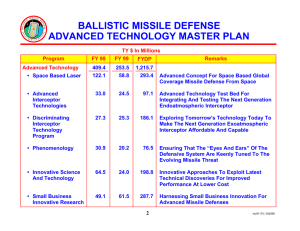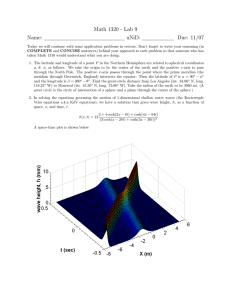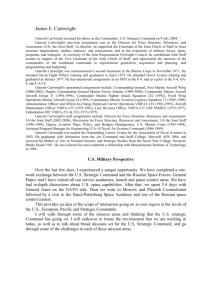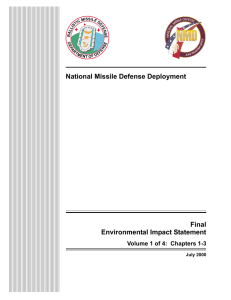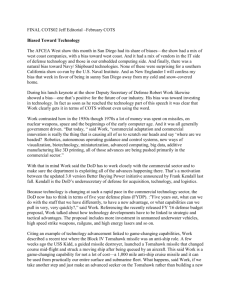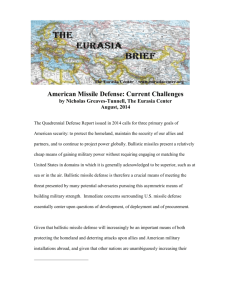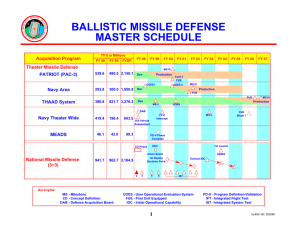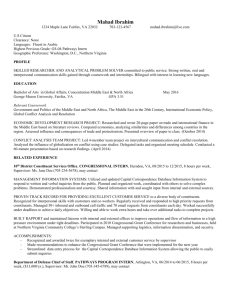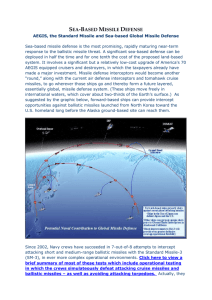SDI - Oswego
advertisement
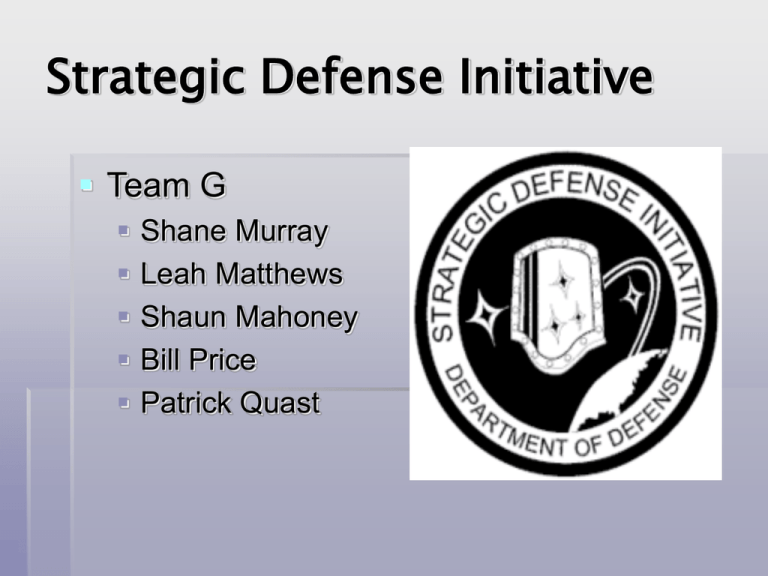
Strategic Defense Initiative Team G Shane Murray Leah Matthews Shaun Mahoney Bill Price Patrick Quast Strategic Defense Initiative Concept-History-Scope By: Shane Murray Concept Destroy intercontinental ballistic missiles bound for United States territory Interceptor Missiles/Lasers Ground and Spaced Based Weapons Missiles based from land Lasers on satellites orbiting over United States “Like hitting a bullet with a bullet” Missiles traveled nearly 16,000 mph Unrealistic History Cold War Nuclear Arms Race USSR created need for a national defense system. 1983 President Ronald Reagan proposed SDI plan In direct violation of 1972 Anti-ballistic Missile Treaty (ABM) Scope SDI project re-routed as National Missile Defense (NMD) Battlefield sized SDI Destroy missiles on smaller scale over a specific battlefield Iraqi SCUD missile NMD becomes heavily funded with nuclear proliferation at a new high Korea, Iraq, Syria and Libya all obtain nuclear arms Sensor systems ex) Radars: they perform signal processing on data perceived by the sensor Imaging radar A single computer incorporated into the radar would perform the processing, storage, and analysis Interceptor Can locate and destroy missiles on their own Would provide continuous world-wide coverage against limited or accidental ballistic missile strikes. Using already produced, commercial computers could be cheaper and simpler if software was just created for the computers More reliable and efficient, less expensive Software development would not have to wait for the hardware, in case schedules are not met. Computers can also help with communication among the battle managers, sensors, and weapons Space to space Space to ground Ground to space Info transmitted would be digitally encoded Info is transmitted10^7 bits/second Examples of topics of communication Location of targets and weapons Status of resources Decisions that have been made Can predict the behavior of different system designs To anticipate threats against the system To model different ways in which the system will work Provide realistic environment in which the system might work To test the functioning of the system as a whole, both before and after deployment Example: A computer that would be used in an aircraft can be tested for durability during flight Pros And Cons Of Strategic Defensive Initiative By Shaun Mahoney Pros Protection from a Nuclear Attack Feasible Technology Now Affordable Very High Protection Rate Of Oncoming Attacks More Jobs Safety Cons Little Success or Accuracy Radiation Costs For Program Could Be Used For Other Expenses For The Country Might Never Be Used Creator and Supporter Former U.S. President Ronald Reagan Introduced the program in 1980’s at the height of the Cold War Believed that such a program was necessary to defend our country against incoming attacks by hostile nations (particularly the Soviet Union) Current Supporter President George W. Bush The S.D.I program was a major part of his 2000 Presidential campaign Reintroduced the program after Former President Clinton demoted it during his presidency Sources within the White House confirm that the Bush administration has conducted secret research that could produce a powerful ground-base laser meant to shatter enemy satellites Miscellaneous Support The United States State Department- One official quoted in 2006 as saying “Our government will continue to consider possible role that space-related weapons may play in protecting our assets.” The Pentagon- Announced the results of three tests of missile interceptors over the Pacific Ocean, making clear that they are considering weapons of S.D.I. nature Current and Future Support Poll of Mother’s in four states (Ohio, Pennsylvania, Florida, and Wisconsin) found that they too support a missile defense system Participant's believed that a missile defense system would make them feel safer and would like one developed as soon as possible However, this poll was conducted by the Missile Defense Advocacy Alliance (MDAA) Opponents of SDI Main Opponents Congress Press/Media American Public Military Contractors Congress-Main Reasons Potential for Public Embarrassment Huge Bill Need for expanded taxes Upset Tax Payers Defense Contractors The Holy Grail of Defense Contracts Too expensive Too complicated Just out of reach in terms of a finished product American Public Fear of if something went wrong, there would be no back up Soviet Hacking Against raised taxes
